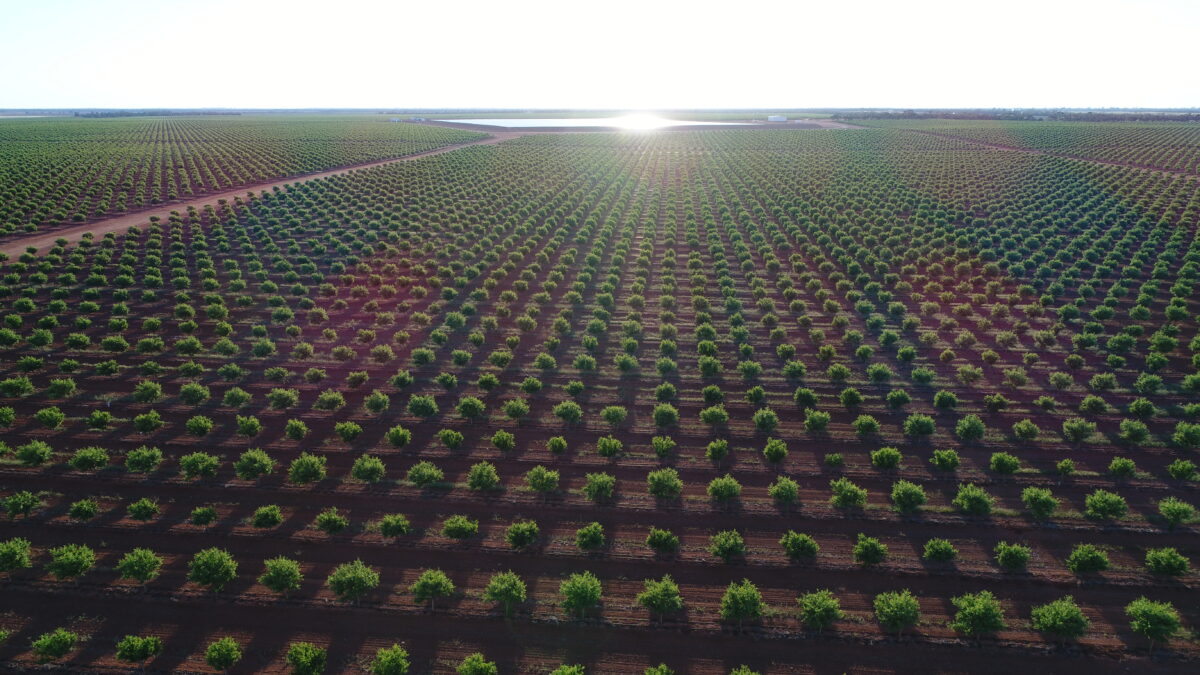A leading Australian farmland management company has announced an expansion of its solar microgrid strategy in a move that will cut diesel usage by 85%.
Having already unveiled plans for a microgrid system at almond farm Cadell Orchards in 2022, Australian Farmland Services (AFS) confirmed it will partner with AGL Energy (AGL) on renewable systems at two of its other sites in southwest New South Wales.
Construction at Cadell Orchards began last week. The 1,690ha almond orchard is currently not connected to the grid, with irrigation from electric pumps powered solely by diesel generators.
The microgrid system at Cadell will be built, owned and operated by AGL under a 20-year power purchasing agreement. It features a 4.9 MW tracking solar array, a 5.4 MWh battery system and 7km of new underground powerlines.
In addition to Cadell, AGL will also construct a 6.5 MW solar array and 5.1 MWh storage system will be built at nearby Canally Orchards. Like Cadell, the 2,500ha Canally site also uses 100% diesel to power its irrigation.
AGL said the microgrid system will cut the two farms’ combined Scope 1 CO2 emissions by 10,900 tonnes over the course of the power purchasing agreement.
The energy gen-tailer will also explore the possibility of using excess solar from Canally to power trucks and agricultural vehicles transporting produce to nearby processing facilities.
AFS chief executive officer David Armstrong said the microgrid systems will drastically reduce the two farms’ reliance on diesel.
“We are working closely with AGL as they design, build and operate the solar-powered microgrid at Cadell Orchards and Canally Orchards and deliver the almond farms an 85 percent reduction in diesel fuel, slashing our emissions and providing substantial cost savings each year,” he said.
“As one of the largest employers in the region, these renewable energy projects provide our businesses with greater energy price certainty and better energy reliability so we can focus on producing Australian-grown almonds.”
AGL will conduct a feasibility study at a third site, the Murray Downs Processing Plant, also located in the Riverina region.
The study will design an onsite microgrid to power the almond processing facility using the “lowest cost” mix of available grid energy, solar and diesel to provide energy stability.
Results of the study are expected to be complete by the end of the year.
“AGL has been working with AFS to model energy usage and to design an integrated and innovative renewable energy system to lower their costs and meet their future needs across Cadell Orchards, Canally Orchards and Murray Downs Processing Plant,” said Jo Egan, AGL’s Chief Customer Officer.
“We are excited to support AFS achieve their sustainability goals and work together to complete three large renewable energy projects in the Riverina community.”
“Our partnership is testament to the great work we are doing in partnering with businesses to provide tailored energy solutions and support our customers to decarbonise the way they live, move and work.”
Australia’s almond industry has expanded by more than 200% in the past decade, and the country is now the second-largest almond exporter in the world behind the US.
With many farms situated in close proximity to the Murray-Darling Basin, the industry has faced scrutiny because of its heavy reliance on water for irrigation.
This content is protected by copyright and may not be reused. If you want to cooperate with us and would like to reuse some of our content, please contact: editors@pv-magazine.com.








By submitting this form you agree to pv magazine using your data for the purposes of publishing your comment.
Your personal data will only be disclosed or otherwise transmitted to third parties for the purposes of spam filtering or if this is necessary for technical maintenance of the website. Any other transfer to third parties will not take place unless this is justified on the basis of applicable data protection regulations or if pv magazine is legally obliged to do so.
You may revoke this consent at any time with effect for the future, in which case your personal data will be deleted immediately. Otherwise, your data will be deleted if pv magazine has processed your request or the purpose of data storage is fulfilled.
Further information on data privacy can be found in our Data Protection Policy.